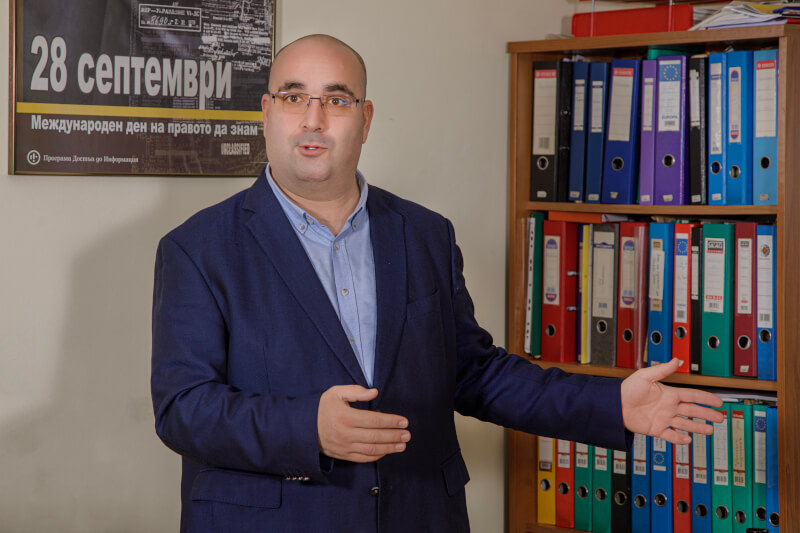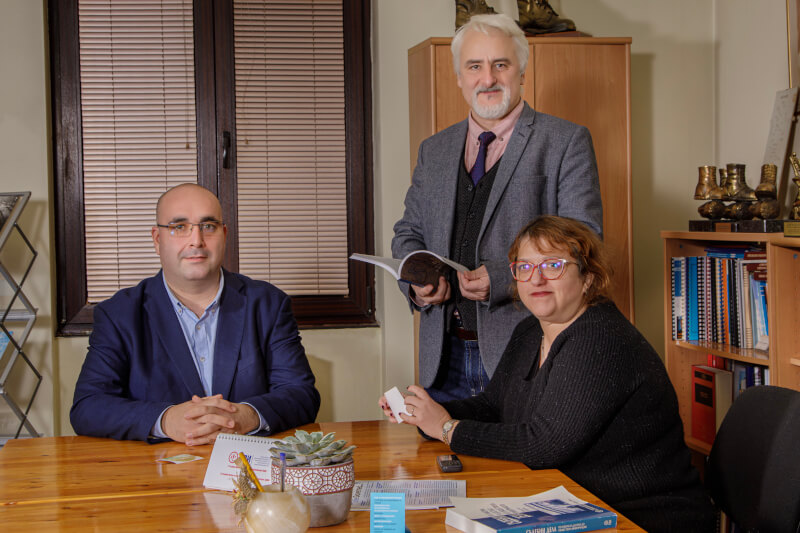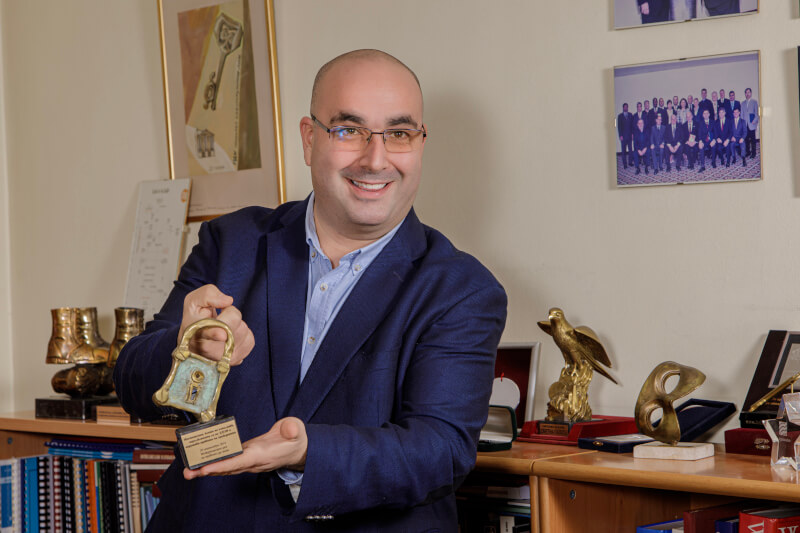
Sometimes, governments prefer to keep certain information under wraps. Poor handling of an emergency, unclear criteria in awarding government contracts, insufficient safety precautions in organizing public events… The list could go on.
It is Stephan Anguelov’s job to ensure that you can question your government about it—and that the government provides a truthful and complete answer.
Stephan is a human rights lawyer with the Sofia-based nonprofit Access to Information Programme Foundation (AIP) who has dedicated his career to making information more accessible to the public. He is helped in his mission by the Access to Public Information Act, a powerful tool that obliges governments to answer citizens’ questions and holds them to account if they don’t.
It is so democratic a tool, in fact, that governments love to have it on paper—they just don’t like it being used. In his memoirs, former British prime minister Tony Blair famously called himself a “naive, foolish, irresponsible nincompoop” for helping to pass the legislation’s UK equivalent (called the Freedom of Information Act, like the US law).
Globally, freedom of information legislation helped uncover misuse of public funds by members of parliament (resulting in jail terms!) and healthcare deficiencies in the UK, secret surveillance of civil rights activists in the US, and government waste and longstanding air pollution in Bulgaria.
Enacted partially thanks to AIP’s efforts, the Bulgarian law makes filing a request for public information relatively simple. The government-maintained access to information platform is “a big thorn in the administration’s side, but it is good for citizens because it orients you,” Stephan says.
Despite the platform’s accessibility, it is a good idea to get Stephan and his colleagues involved from the get-go and not only after you have received a rejection or a partial answer. AIP lawyers will ensure you are asking the right questions of the right institutions. After trying nearly 600 court cases—and winning many of them!—Stephan and his colleagues are experts at getting the job done. The result is a more informed public debate, a more transparent government, and a healthier democracy.
We asked Stephan about the importance of seeking answers and persisting in the face of rejection or obfuscation, about the topics his clients are interested in, and about Bulgarians who use right-to-know legislation successfully to change their communities for the better.
America for Bulgaria Foundation: Why do we talk about freedom of information, and why do we need a special law to safeguard it?
Stephan Anguelov: It is an old idea that institutions in a democratic society should be accountable for their actions to the citizens whose interests they protect. The interests of the various social strata should meet in the National Assembly [Bulgaria’s legislature, ed.], where they are served by the people’s elected representatives, and we have access to the National Assembly’s workings through the debates that are broadcast on television. Over the years, it has become apparent that this is not quite enough and that the authorities need to be more transparent, which is evidenced by the struggle for access to various documents that the executive branch of government processes and stores in connection with its activities.
This is also part and parcel of the public administration’s expansion. Two hundred years ago, it was much easier to ask a government minister something, and he could tell you what the hundred people in his ministry were doing across the country. Nowadays, each ministry’s staff in Sofia alone numbers 300 people, regional administrations consist of hundreds of employees, and we know just how large public administration is in Bulgaria, and its work cannot be accounted for through one answer to one question in the National Assembly. Much more information sharing is required as the administration collects and creates much more information in its operations than before.

After the end of the Second World War, the debate about the need for more transparency in public institutions began in earnest. This is also connected with the Cold War, with the high level of secrecy, and with society’s need and desire for more accountability and participation in state power. That’s when the relevant laws began to evolve. More than 200 countries in the world have freedom of information laws. The Bulgarian law dates back to 2000.
There are other countries with right-to-know legislation that’s better on paper, but in Bulgaria the courts are quite impartial. The Bulgarian law provides for expanded right of access, and this is largely due to the work of the Access to Information Programme Foundation because of its persistence in trying countless freedom-of-information cases.
ABF: How does Bulgaria’s Access to Public Information Act help ordinary people, and what are the topics that information seekers are interested in?
S.A.: This law helps ordinary people by enabling them to access information such as whether a certain document exists and what kinds of documents exist. It is also very valuable to determine that there are no documents on a subject you are interested in, so that you can be an informed participant in public decision-making.
When Sofia Municipality suddenly decides to change the price of a single-ride ticket for public transportation, it should publish all the information related to the price increase—that is, a formal motivation, a financial assessment of why the increase was necessary, etc. Very often, however, it turns out that because the decision is rushed, some documents are not released.
Very often, documents related to public spending are requested—how a contract was signed, what it covers, what funds were paid under the contract, and whether payments were limited only to what was agreed in the contract. Contracts are often extended and costs inflated behind the public’s back.
People are always looking for environmental information. They demand accountability for funds spent, whether from the municipal or state budget. Right-to-know requests seek information about various repairs, of smaller or larger infrastructure, about construction, and about construction oversight. Frequently, people want to know what the oversight bodies are doing and what the results of their inspections are. A fellow lawyer, who received an award at this year’s Right to Know Day ceremony on September 28, conducted a investigation into traffic police fines. His research determined that although traffic police officers impose fines, they collect no money from them or collect much less than they should.

ABF: How straightforward is it to file a freedom-of-information request? Can anyone do it?
S.A.: In Bulgaria, the system was built on the understanding that freedom of information is a fundamental right. The Constitutional Court indicated as early as 1997 that access to information is a public good in a democratic society and a prerequisite for the free expression of opinion and informed decision-making.
The filing procedure is very simple. If you are a citizen, you must provide your full name and an address for correspondence and specify what information you are looking for. The request does not need to follow a specific format and can be written in your own words; we have published a sample request on our website. Request forms are not mandatory, they are only there to help people.
You can send your request directly to a public institution or use the public information access platform maintained by the Council of Ministers.
The platform is a big thorn in the administration’s side, but it is good for citizens because it orients you. The platform is also useful because it publishes the institutions’ responses to requests for information and can direct you to information that has already been requested and released. Depending on how conscientious public institutions are, you can find, more or less successfully, the information you are looking for. You can also use keywords to search in the text of requests for information.
ABF: How do you and the other lawyers from the Access to Information Programme facilitate this process?
S.A.: Citizens come to us at various stages of the process, most often when they decide they have reached a dead end. The best time to get in touch is when they are preparing their request for information—that is, at the very beginning. It is important how you phrase questions and which institution you ask. Because of our vast experience, we know what documents to ask for and what to expect from a question. Therefore, we very often help people clarify their questions and direct them to the right documents or the right institution. It is often the case that several different institutions may have something to say on a subject, and it is very useful to ask them all at the same time and compare answers.
Even if we don’t know what documents we can access, asking questions is very valuable. How do air quality monitors in Sofia work? We were in the middle of our third lawsuit for the release of air quality data when we realized that we didn’t even know how these monitors worked, so we asked. Please explain to us how these monitors work, how they make measurements, with what frequency, how you store that information. When they responded, we were able to convince the judge that the responsible agency had the data we wanted and that it should release it to us.
We help everyone—citizens, NGOs, journalists, but also public administration officials—apply the access to public information act in the interest of society and informed public debate about what political and administrative decisions are made and how public funds are spent.

ABF: Please give us some examples of citizens successfully applying the freedom of information act.
S.A.: Nataliya Stancheva, a nurse at the Kozloduy Nuclear Power Plant, had doubts about whether plant employees’ health was monitored in accordance with the law. Through a series of access requests, she managed to obtain documents that confirmed her suspicions. Thanks to the information obtained through these requests, she filed reports to the various oversight bodies, some of which conducted inspections and detected violations. This is a good example of how a citizen who is not a lawyer and had never dealt with right of access before managed to force public authorities to release the data and do their job. What is more, we didn’t have to sue! !
Venelin Urumov from Burgas, a former car racer, coach, and car designer, inquired about the Bulgarian Motor Federation’s safety requirements for car races. It turns out that accidents happen very often: cars drive off the road and into the audience or judges. There are frequent deaths and injuries among racers, too. One question is regularly raised: Is this racing track properly constructed? There are rules issued by the International Motor Federation, but the Bulgarian Motor Federation does not seem to have implemented the specific rules for individual sports disciplines.
Environmental NGO Za Zemiata (“For the Earth”) and Greenpeace Bulgaria fought very hard for the release of hourly air quality data in Sofia, which is collected by automatic air quality monitors, and their persistence paid off. They also managed to reverse the practice of the Executive Agency on the Environment, which until then claimed that it could not provide hourly data. All denials were overturned by the court. After losing several lawsuits, the Agency started providing access to hourly data.
ABF: How often do journalists use the Access to Public Information Act?
S.A.: It is mostly used by investigative journalists and is not particularly useful in daily journalism as requests take more time. Unfortunately, investigative journalists are becoming increasingly scarce. The Access to Information Programme team works with 28 publicity coordinators in each of Bulgaria’s 28 administrative districts, all of whom are supposed to be working in a local newsroom. When I joined the team in 2010, our coordinators worked in newsrooms consisting of seven to ten people, and there were at least two other local media in town. Now they are the only ones left in the newsroom, if there is a newsroom at all; many are stringers for several national media outlets to make ends meet. Local media are gone. There is practically no local investigative journalism in Bulgaria; the only exception is Za istinata (“For the Truth”) platform.
ABF: Does this make citizens’ involvement in the information–seeking process even more important today?
S.A.: The Access to Public Information Act is certainly one of the accessible methods of uncovering information. However, it is important to have investigative journalists because they are the ones who can communicate well, they process the information and make it available to a larger group of people.
Nataliya Stancheva, for example, had collected a huge amount of high-quality information, but for a long time she could not communicate it in any way, until several local media wrote about the topic.
ABF: What happens to most of the information collected through freedom of information legislation?
S.A.: A lot of information is available, but communicating it is difficult. This is where independent media play an important role, as they have the capacity to pay attention to interesting issues and present them to the public. It is difficult for an individual to get through to the media; to do so, they must be at least as persistent as Nataliya Stancheva was.
Very often, the findings are covered by a local media outlet, and that’s where the story ends. This is what happened with Natalia Dimitrova and the information she obtained about a new sports facility in Blagoevgrad. Natalia had seen a brief news item on the Blagoevgrad municipality’s website about a new facility for cycling, a pump track. Starting there, she asked the municipality who built the track, what construction documents it had for it, how much it cost, who provided construction oversight. It turned out that none of these documents existed. A municipal company had built the track, but there was no further information. There were no documents or warranty for the track; the municipality had circumvented its own sports facility construction rules, claiming that the track was not a sports facility, but a “park element.” The absurd thing in this case is that on its website the administration was bragging about the new facility where young people could practice a sport—cycling. It became clear that there was no maintenance, warranty, or insurance for the track. So, if there was an accident, the municipality would be liable, without having ensured compliance with legal standards. This was covered by a local media outlet and in our newsletter.
There are many such small battles that citizens win against public authorities. Those who make a sustained effort are especially valuable because, eventually, they get to the bottom of a problem and can use the information in the next public discussion on the subject.
ABF: Can we conclude that the filing of public information requests by citizens enhances democracy?
S.A.: Filing freedom of information requests creates a disposition toward accountability among public administration officials and politicians as well as an obligation to be transparent and accountable to the public. In certain cases, we need to monitor them more closely, and the Access to Public Information Act enables us to do so more easily. The law certainly improves public debate and informed decision-making. In this sense, it enhances democracy.
ABF: The International Freedom of Information Advocates Network was founded in Sofia on September 28, 2000, on the initiative of AIP. The date also marks International Right to Know Day, which achieved United Nations recognition and is celebrated worldwide. How does AIP mark this day?
S.A.: On this day, we present the most interesting stories that happened to us during the previous year, including the funniest cases and the most absurd answers we get.
Stephan Anguelov has a law degree from the European University Centre (Nancy 2 University) and a degree in philosophy from the University of Paris 1 Panthéon-Sorbonne. He joined the Access to Information Programme team in 2010.
Established in 1996, AIP is a nongovernmental organization providing legal assistance to citizens, journalists, nongovernmental organizations, and businesses in cases involving access to information. AIP works with the long-term support of the America for Bulgaria Foundation.

